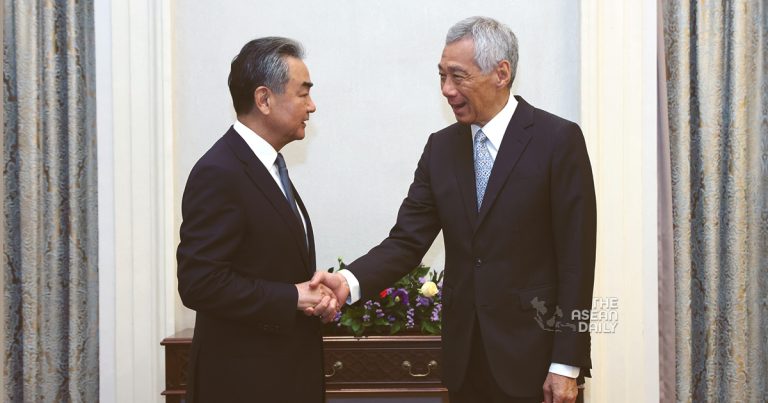11-8-2023 (SINGAPORE) Singapore’s Prime Minister Lee Hsien Loong and Chinese Foreign Minister Wang Yi reasserted the robust and substantive relationship between their nations during a momentous meeting held on Friday, August 11th. This reaffirmation comes following the elevation of bilateral ties earlier in the year, a decision that was spurred by a significant discussion between Mr. Lee and Chinese President Xi Jinping in Beijing.
The Ministry of Foreign Affairs in Singapore highlighted that this upgraded partnership stands as a testament to the shared dedication of both nations in expanding bilateral cooperation. Furthermore, it underscores their joint commitment to venturing into new territories of collaboration, particularly in the realms of the digital and green economies.
During the recent meeting, Prime Minister Lee and Foreign Minister Wang engaged in thoughtful deliberations on expanding and enriching their collaborative efforts. Their collective aim is to foster mutual benefits not only for their respective countries but also for the broader region. The Ministry of Foreign Affairs articulated this sentiment in a press release, underscoring the emphasis placed on deepening regional cooperation for mutual advancement.
Foreign Minister Wang Yi also provided Prime Minister Lee with insights into China’s foreign policy priorities. Lee Hsien Loong extended his warm appreciation for China’s sustained engagement with the Association of Southeast Asian Nations (ASEAN), and he expressed his eagerness for closer and more comprehensive ASEAN-China cooperation. This mutual commitment was further underscored by the shared belief in nurturing an open, peaceful, and inclusive environment within the region.
As part of his diplomatic engagements, Minister Wang Yi also met with Singapore’s Deputy Prime Minister and Finance Minister Lawrence Wong. Their discussions encompassed a comprehensive review of the substantial progress made in bilateral cooperation. The thriving governmental collaboration has been particularly anchored by prominent projects in Suzhou, Tianjin, and Chongqing, along with established frameworks like the Joint Council for Bilateral Cooperation (JCBC).
This year marks the 15th anniversary of the Sino-Singapore Tianjin Eco-City project. Both nations are poised to leverage this milestone to rejuvenate and invigorate their bilateral cooperation. In this spirit, Minister Lawrence Wong is scheduled to lead a delegation to China later in the year to co-chair the 19th JCBC session alongside Chinese Vice Premier Ding Xuexiang.
In a notable move, Minister Wong expressed his provisional support for China’s expressed interest in joining the Comprehensive and Progressive Agreement for Trans-Pacific Partnership (CPTPP), a dynamic trade pact encompassing nations along the Pacific rim. Originating in 2018, this trading alliance was initially established among 11 countries including Singapore. The United Kingdom’s recent formal signing of the CPTPP treaty solidified its place as the first European nation to join this influential bloc.
China, having submitted its application in September 2021, is now considering joining the CPTPP. This involves an adherence to the pact’s exacting standards and substantial market access commitments. Importantly, any participation is contingent upon unanimous agreement between China and all existing CPTPP partners.
Minister Wong also extended a cordial welcome to China’s application to the Digital Economy Partnership Agreement (DEPA). This particular agreement unites Singapore, Chile, and New Zealand in a concerted effort to facilitate digital trade and establish a comprehensive framework for the burgeoning digital economy.
In a testament to the depth of bilateral cooperation, Foreign Affairs Minister Vivian Balakrishnan hosted a dinner for Minister Wang Yi on the previous day. During this convivial meeting, both dignitaries underlined the unwavering strength of their bilateral ties. They also took the opportunity to conduct a comprehensive review of the multifaceted cooperation that underpins the relations between Singapore and China. The outcome of this interaction was a mutual commitment to further enhancing the flow of both business and people between the two nations. Additionally, the two ministers identified promising avenues for new growth, particularly within the domains of sustainable development and the burgeoning digital economy.




